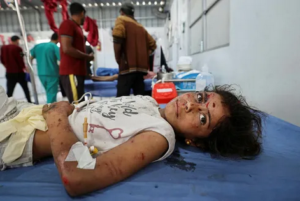Israeli Jews think that attacking a hospital is a war crime – unless the IDF does it

Smoke billows from a building at Soroka hospital in Beersheba, after an Iranian missile attack on 19 June 2025
Ahmad Tibi writes in Haaretz on 25 June 2025:
Following the missile strike on Be’er Sheva’s Soroka Medical Center last week, my colleagues and I posted clear criticism on social media of this attack on a hospital. I wrote that this was a serious crime and that civilians and medical personnel mustn’t be harmed, just as one mustn’t attack hospitals, paramedics and medical staffers in the Gaza Strip.
Within minutes, a flood of responses had arrived: “How can you compare?” What an ugly comparison.” “There’s no comparison.” This is an automatic response on the part of many Israeli Jews – a kind of reflex aimed at blocking any attempt to draw moral equivalences, criticize or hold up a mirror that’s unpleasant to look into. The subtext is clear: It’s permissible for Israel, but what it is allowed to do, others may not.
Israel is always defending itself; it is always right; it is always fighting “for the sake of peace and democratic values.” In contrast, the other side is always suspect, always a terrorist, always a liar, always a Nazi, always Amalek. Israelis live in a dichotomy of good and evil, black and white. But of course, this is both factually and morally untrue. In reality, not only do we have an obligation to compare, but the very denial of the possibility of making comparisons reveals the depth of the problem.
The official responses to the strike on Soroka exemplified this absurdity. National Security Minister Itamar Ben-Gvir, for instance, tweeted, “Nazis who launch missiles at hospitals, at elderly people and children.” Is there no mirror around? What about a basic fact check? Perhaps a reality test? But the truth is, you can’t expect anything from someone whose failure has been so resounding.
Prime Minister Benjamin Netanyahu similarly wrote that “the tyrants from Tehran bombed a hospital and wounded civilians. Therefore, we will exact a price from them.” Does he remember the list of hospitals that Israel has bombed?
It was recently reported that more than 400 medical staffers have been killed in Gaza. Many others have been imprisoned and tortured. Dozens of hospitals have been shut down, destroyed or turned into another item in the Israeli army’s target bank. Medical equipment was confiscated, patients weren’t evacuated and ambulances were destroyed.

A wounded Palestinian child in central Gaza in May 2025
Needless to say, these are serious acts. They are immoral and completely unacceptable. In other words, they are crimes. But, when they are Israel’s actions, the moral outcry goes silent. Instead, in response to every criticism, we hear false accusations of antisemitism.
Similarly, when we cry out against the numerous attacks by settlers in the West Bank territories – attacks that include arson, stone-throwing, destruction of property and shooting – people on the right immediately spring into action to insist that “there is no such thing as Jewish terrorism” and that the assailants are “only an extremist minority” or “wild weeds.” And the unacceptability of comparisons also crops up again: “You’re comparing terrorists to patriots?”
The same tune is heard when petitions are filed to the Supreme Court demanding that the home of a Jew who murdered a Palestinian be demolished, as they were in the case of Amiram Ben-Uliel, who murdered the Dawabsheh family but is considered “holy and righteous” by a certain female Knesset member – “there’s no comparison.”
In fact, the Supreme Court itself ruled that there is a substantive difference. Or in other words, there is no equality before the law. When the terrorist is Jewish, the same court that has upheld demolishing hundreds of Palestinian homes without a trial suddenly discovered a moral scale that allowed it to avoid applying the same law to Jews. Suddenly, there was no need for “deterrence” – the routine excuse for demolishing Palestinians’ homes.
This is also true of administrative detentions, or detentions without trial – something I comprehensively oppose. According to Defense Minister Israel Katz, this tactic must not be used against Jews. Only Palestinians, on both sides of the Green Line, are thrown into administrative detention.
The ban on comparisons similarly arises with regard to Israeli journalists who incite against residents of Gaza by saying that “there are no innocents/uninvolved civilians” there and that we need to flatten, destroy, starve and annihilate. When you point out to them that journalists in Rwanda were convicted by the International Criminal Court for similar incitement, the immediate response, here too, is that “it isn’t the same thing.”
How do Israelis explain that it’s not the same thing, given the fact that since the war began, the Israel Defense Forces has bombed dozens of hospitals, clinics, ambulance stations, fertility clinics and maternity homes in Gaza? They rationalize on autopilot: “But they fired rockets from there.” “There were terrorists there.” “There was no choice.”
In other words, in these Israelis’ view, bombing hospitals isn’t a patent war crime but is actually permitted under certain conditions – though only for Israel. After all, they continue, Israel always conducts surgical strikes. And if a given operation had a different outcome, then it’s Hamas’ fault.
Israel never bears responsibility or engages in soul-searching; it only denies the allegations and gets outraged over the very fact that comparisons are made. If even half the criticism of making comparisons was aimed at the actions themselves, we would be living in a very different place.
“There’s no comparison” has become the default option. But why, really, is it wrong to compare? Do Palestinians have less of a right to life than Israelis? Do they not deserve the same medical treatment as Israeli patients? Does a doctor in Gaza not deserve the same protection as a doctor in Be’er Sheva? Is an Israeli girl worth more than a Palestinian girl?
If attacking hospitals is forbidden, then it’s always forbidden. And if damaging them is a war crime, then it doesn’t matter whether the bomb was painted with an Israeli flag and funded by America or painted with an Iranian flag.
The Jewish Israeli insistence that “there’s no comparison” effectively means “comparisons are bad for us.” The harsh response to any comparison stems from the fact that it undermines what Israel views as its monopoly on morality. The statement “there’s no comparison” is meant to reject the very possibility of moral judgment and to preserve the political, ethnic and narrative supremacy. It preserves an invented boundary between the “enlightened” side and the “uncivilized” one, between the side that’s “defending itself” and “the attacker.”
This is a view that enables Israel to do anything it pleases without being held accountable, either by itself or by the world. And unfortunately, so far, the trick has worked. The world continues to grant Israel complete immunity and full freedom of action. The United States backs it and funds it, while Europe is silent. As a result, the bombs continue to fall, children continue to die and Israeli Jews refuse to look in a mirror.
Is there really no comparison? On the contrary, we are obligated to compare. But for hundreds of thousands of people, this will be too little, too late.
This article is reproduced in its entirety
